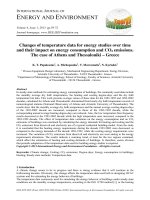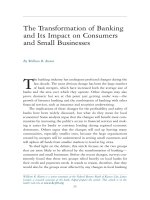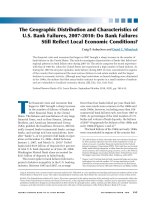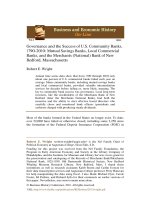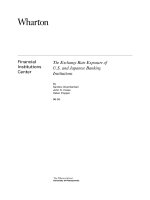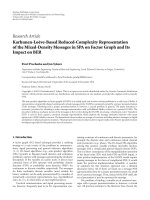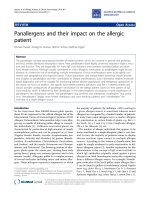the reputation of underwriters, the bonding hypothesis, and the impact on the information environment of u.s cross-listed firms
Bạn đang xem bản rút gọn của tài liệu. Xem và tải ngay bản đầy đủ của tài liệu tại đây (1.27 MB, 177 trang )
THE REPUTATION OF UNDERWRITERS, THE BONDING HYPOTHESIS, AND
THE IMPACT ON THE INFORMATION ENVIRONMENT OF
U.S. CROSS-LISTED FIRMS
DISSERTATION
Presented in Partial Fulfilment of the Requirements for the
Degree Doctor of Philosophy in the Graduate School of the
Ohio State University
By
Gilberto Loureiro, M.Sc.
The Ohio State University
2007
Dissertation Committee:
Approved by
Professor G. Andrew Karolyi , Co-advisor ____________________
Co-advisor
Professor Anil Makhija, Co-advisor ____________________
Co-advisor
Professor Henrik Cronqvist
Graduate Program in
Business Administration
ABSTRACT
The first essay of this dissertation tests whether hiring a reputable underwriter to
sponsor equity offerings of foreign firms, that occur when they cross-list on a U.S. stock
exchange, is a “reputational bonding” mechanism. In line with the Bonding Hypothesis
of Stulz (1999) and Coffee (1999, 2002), I find that foreign firms that cross-list in the
U.S. and undertake IPOs are more likely to employ reputable underwriters if the firms
come from countries with poor shareholder protection. The additional monitoring
provided by reputable underwriters may help overcome the skepticism of U.S. investors,
and explains the higher valuation these firms obtain after the offering. There is, however,
a price to be paid for this bonding benefit. I find that issuers from countries with low
shareholder protection tend to be more underpriced if they are sponsored by prestigious
underwriters.
In the second dissertation essay, I examine whether the decisions to raise equity
and hire a reputable underwriter to conduct the offering impacts the information
environment of foreign firms cross-listed on a U.S stock exchange. Using a sample of
cross-listed firms from 1980 to 2004, I find that those that raise equity and hire a
reputable underwriter, within three years after cross-listing, observe higher analyst
coverage and more accurate earnings forecasts.
ii
Furthermore, I conclude that these improvements in the firm’s information
environment are likely to positively affect firm value – the empirical evidence shows a
positive relation between analyst coverage/forecast accuracy and Tobin’s q. More
importantly, the valuation of firms sponsored by top underwriters tends to be more
sensitive to improvements in forecast accuracy. Overall, the results of this essay
complement the findings of Lang et al. (2003) and shed some light on the monitoring role
of reputable underwriters via their impact on firm’s information environment.
iii
ACKNOWLEDGMENTS
I would like to thank my advisors Andrew Karolyi and Anil Makhija and my
committee member Henrik Cronqvist for their constant guidance, encouragement, and
insightful comments. Their contribution was fundamental in all stages of my research. I
am also grateful to Rüdiger Fahlenbrach for his comments and cooperation.
I also thank René Stulz, the seminar participants at the Ohio State University, and
my colleagues who participate at the doctoral seminars for their helpful comments and
suggestions. A special thanks to Roger Loh, Angie Low, Taylor Nadauld, and Carrie Pan
for their interest in my research and helpful suggestions.
Finally, I thank the University of Minho and the Fundação para a Ciência e a
Tecnologia (FCT) for financial support.
iv
VITA
January 21, 1974………………… … Born in Valongo (district of Porto), Portugal.
1997 … “Licenciatura” in Economics, Faculdade de Economia do Porto, Portugal.
2002 Master of Science in Business Administration – Finance, Universidade do
Minho, Portugal.
FIELDS OF STUDY
Major Field: Business Administration
Concentration: Finance
v
TABLE OF CONTENTS
ABSTRACT ii
ACKNOWLEDGMENTS iv
VITA v
LIST OF TABLES ix
LIST OF FIGURES xi
CHAPTER 1: Introduction 1
CHAPTER 2: The reputation of underwriters: A test of the Bonding Hypothesis 6
2.1. Introduction 6
2.2. Literature review and hypotheses 12
2.2.1. Cross-listing and the Bonding Hypothesis: the role of underwriter reputation12
2.2.2. Benefits of hiring a reputable underwriter 14
2.2.3. IPO underpricing and the cost of reputable underwriters 15
2.2.4. Main Hypotheses 19
2.3. Data 20
2.4. Descriptive statistics and univariate analysis 24
vi
2.5. Multivariate analysis 30
2.5.1. The likelihood of hiring a reputable underwriter 30
2.5.2. Robustness checks 36
2.5.3. The value of hiring a reputable underwriter 42
2.5.4. The cost of hiring a reputable underwriter 46
2.6. Other Analyses 49
2.6.1. Seasoned equity offerings: Later SEOs 49
2.6.2. Private placements 52
2.7. Conclusions 53
CHAPTER 3: The impact of hiring a reputable underwriter on the information
environmnet of cross-listed firms 56
3.1. Introduction 56
3.2. Data and descriptive statistics 65
3.3. Multivariate Analysis 71
3.3.1. The impact of raising equity and hiring a reputable underwriter on a firm’s
information environment 71
3.3.2. Robustness Checks 77
3.3.3. Forecast accuracy: “star” versus “non-star” analysts 82
3.3.4. Underwriter reputation, analyst coverage and forecast accuracy, and their
impact on firm value 84
3.4. Other Analysis 88
3.4.1. Univariate analysis: Differences before and after cross-listing 88
vii
3.4.2. Alternative hypotheses 91
3.5. Conclusion 95
CHAPTER 4: Conclusions 98
LIST OF REFERENCES 101
APPENDIX A: List of variables used in Chapter 3 108
APPENDIX B: Estimation procedure to mitigate sample selection bias 111
APPENDIX C: Tables 113
APPENDIX D: Figures 157
viii
LIST OF TABLES
Table 1: Summary Statistics . 113
Table 2: Tests of equality of means: Variables segmented by CM measure of underwriter
reputation and by Anti-self-dealing (ASD) index 116
Table 3: Probit regressions: The probability of hiring a reputable underwriter . 119
Table 4: Robustness check of the probability of choosing a reputable underwriter –
Heckman model. 122
Table 5: Regressions of Tobin’s q . 123
Table 6: Multifactor regressions using calendar-time returns 125
Table 7: Regressions of first-day returns 127
Table 8: Two-stage OLS regressions of first-day returns 129
Table 9: Regressions of Gross Spreads 131
Table 10: Probit regressions: Later SEOs 133
Table 11: Summary statistics: Private placements 135
Table 12: Probit regressions: Private placements . 136
Table 13: Sample size and summary statistics 138
Table 15: Firm-level regressions of analyst coverage and forecast accuracy one year after
raising equity/cross-listing 141
ix
Table 16: Firm-level regressions of analyst coverage and forecast accuracy – Heckman
model 143
Table 17: Firm-level regressions of analyst coverage and forecast accuracy – Matched
sample . 146
Table 19: Regressions of Tobin’s Q . 151
Table 20: Univariate analysis of differences in means before and after cross-listing. 154
Table 21: Firm-level regressions of analyst coverage and forecast accuracy – Alternative
hypotheses 155
x
LIST OF FIGURES
Figure 1: Percentage of IPOs/SEOs by group of countries 157
Figure 2: Percentage of IPOS/SEOs per region and subperiod. 159
Figure 3: Number of underwriters and percentage of top ranked (CM measure) 160
Figure 4: Number of underwriters and percentage of deals conducted by top ranked (CM
measure) 161
Figure 5: Number of Foreign IPOs and average first-day returns per year. 162
Figure 6: Percentage of Foreign IPOs and Foreign SEOs conducted by top underwriters
by group of countries with high and low ASD index . 163
Figure 7: Firms by country. 166
xi
CHAPTER 1
INTRODUCTION
Over the past two decades researchers have been investigating the reasons why
foreign firms choose to list their stocks abroad and the consequences of that choice.
Karolyi (1998; 2006) reviews this literature in detail. Early studies advocate that the
main reason for foreign firms to cross-list in the U.S. is to break down investment
barriers created by segmentation in the financial markets that would otherwise constrain
their investment policies.
A more recent approach – the Bonding Hypothesis – initiated by Stulz (1999) and
Coffee (1999; 2002), argues that cross-listing on a U.S. stock exchange is a mechanism
through which managers and controlling shareholders of foreign firms “bond” themselves
to improve the corporate governance of their firms and offer a better protection to their
minority shareholders. Foreign firms, especially those from countries with poor
protection of shareholder rights, are expected to benefit more from cross-listing in a
market with more legal shareholder protection, more stringent disclosure requirements,
greater shareholder activism, a more active market for corporate control, and better
financial intermediaries.
1
Most of the literature has focused on the mechanisms of “legal bonding” –
especially emphasized by Coffee (1999; 2002) – such as the disclosure and enforcement
action procedures imposed by the U.S. regulators to all firms cross-listed on a stock
exchange. These requirements are expected to bring more transparency to the firm, and
thereby subject managers and controlling shareholders to a stricter scrutiny. In addition
to these legal requirements, foreign firms can also benefit from other sources of
“bonding” – “reputational bonding” – provided by the monitoring role of a number of
“gatekeepers” (informational intermediaries) that become available after the firm cross-
lists (Stulz, 1999). Examples of these “gatekeepers” are the American debt-rating
agencies, auditors, security analysts, and investment banks involved in underwriting
activities – the underwriters.
This dissertation contributes to this literature by investigating the role of one
mechanism of “reputational bonding”: the choice of a reputable underwriter to conduct an
equity offering that occurs at the cross-listing event.
In contrast with previous studies that focus on bonding mechanisms that apply
uniformly to all cross-listed firms on a U.S. stock exchange, this dissertation provides an
important contribution by analyzing an additional mechanism that is primarily related to a
firm’s decision.
In the first essay, presented in CHAPTER 2, I examine the choice of a reputable
underwriter to sponsor an equity offering that is simultaneous to the act of cross-listing,
and the costs and benefits it imposes to the foreign firm. I argue that these costs and
benefits are affected by the extent of investor protection accorded in the home country of
2
the firm cross-listing in the U.S. Therefore, in line with the bonding hypothesis, cross-
listed firms facing more skepticism from U.S. investors – for instance, those from
countries with poor shareholder protection – are the ones with higher potential gains from
the additional monitoring provided by prestigious underwriters. This prediction should
be stronger for firms seeking immediate benefits by simultaneously cross-listing and
raising equity. Because these firms are not yet known in the U.S. market, have no U.S.
analyst coverage, and no U.S. institutional ownership, the monitoring role of reputable
underwriters may be particularly important.
Using a sample of foreign firms that cross-list in the U.S. and issue equity at the
same time (less than one month after cross-listing), between 1980 and 2004, I test the
prediction that issuers from countries with weak shareholder protection are more likely to
hire a reputable underwriter to sponsor their offerings. The empirical results are
consistent with this version of the Bonding Hypothesis. In line with the idea that the
benefits overweigh the costs, I find that (1) issuers from countries with poor shareholder
protection that hire top underwriters have higher valuations one year after cross-listing
and (2) these firms pay a price for this type of bonding, since their offerings are, on
average, 20% more underpriced.
Furthermore, I extend my analysis to other equity offerings: (1) subsequent equity
offering of firms that have already been sponsored by a top underwriter when they issued
equity at the time of cross-listing, and (2) private placements. The results indicate that,
conditional on having been “bonded” at the initial equity offering, firms with higher
analyst coverage tend to downgrade to a less reputable, but cheaper, underwriter when
3
they raise equity later. As for private placements, there is no evidence that issuers from
countries with poor shareholder protection are more likely to hire top underwriters. This
finding is consistent with the notion that in non-public issues the benefits of the
additional monitoring provided by reputable underwriters is reduced or inexistent.
CHAPTER 3 presents the second essay of this dissertation. This essay is
motivated by the study of Lang, Lins, and Miller (2003) and by the findings discussed in
CHAPTER 2. Lang et al. (2003) find that firms cross-listed on a U.S. stock exchange
have more analysts coverage and forecast accuracy than their peers that do not cross-list.
They link this result to the benefits of “legal bonding” – namely the increased
transparency of the firm. When firms are more transparent, information is more reliable
and easier (meaning less costly) to gather; this brings more analyst coverage and
improves forecast accuracy.
In this essay, I examine the impact on a firm’s information environment of other
actions, taken voluntarily by the firm, in addition to the legal requirements that apply to
all firms cross-listed on a U.S. stock exchange. In particular, motivated by the findings in
CHAPTER 2, I analyze whether hiring a reputable underwriter to sponsor an equity
offering that happens after cross-listing affects firm’s analyst coverage and forecast
accuracy. The prior is that prestigious underwriters, and their team of reputable analysts,
auditors, lawyers, etc., are able to generate more accurate information about the firm, and
thereby, subject managers and controlling shareholders to a more strict scrutiny. Better-
governed firms are able to attract more analyst following and the higher quality of the
information disclosed helps them to make more accurate forecasts.
4
Using a sample of cross-listed firms on a U.S. stock exchange between 1980 and
2004, I find that those that raise equity (within three years after cross-listing) and hire a
reputable underwriter to conduct the offering have, on average, more analyst coverage
(although the effect is only partially robust) and, especially, higher forecast accuracy.
Moreover, not only top underwriters bring more “star” analysts into play, but also they
improve the quality of the information disclosed by the firm in a way that even the
average “non-star” analyst is able to issue better forecasts. Finally, consistent with Lang
et al. (2003), I find that both analyst coverage and forecast accuracy positively affect
Tobin’s q. More importantly, I find that the value of firms sponsored by top underwriters
is more sensitive to accuracy of analysts’ forecasts than the average. This result helps
understand one possible mechanism through which prestigious underwriters bring
additional value to the firm.
To the best of my knowledge, empirical tests on the role of reputable underwriters
as a mechanism of “reputational bonding”, as well as their impact on firm's information
environment, have not yet been covered in the literature. This dissertation is my
contribution to fill this gap.
5
CHAPTER 2
THE REPUTATION OF UNDERWRITERS: A TEST OF THE BONDING
HYPOTHESIS
2.1. Introduction
There is a large literature on why foreign firms cross-list in the US.
1
One stream
of this literature argues that the main advantage of cross-listing is that it breaks down
investment barriers created by segmentation in financial markets (Errunza and Losq,
1985; Alexander, Eun and Janakiramanan, 1987; Foerster and Karolyi, 1999). A more
recent stream of the literature, initiated by Stulz (1999) and Coffee (1999; 2002), offers
an alternative explanation, the Bonding Hypothesis. According to the Bonding
Hypothesis, cross-listing in the U.S. is a mechanism by which managers and controlling
shareholders of foreign firms purposely subject the firm to superior legal, regulatory, and
other institutional monitoring, and thereby offer better protection against expropriation to
minority shareholders.
Foreign firms, particularly those from countries with weak protection of minority
shareholders, are expected to see improvements in their corporate governance because of
1
See Karolyi (1998; 2006) for detailed surveys.
6
the better legal protection of shareholder rights, more stringent disclosure requirements,
greater shareholder activism, an active market for corporate control, and more effective
financial intermediaries. While the act of cross-listing in a U.S. stock exchange
automatically subjects the firm to a number of institutional requirements, such as the
mandatory disclosure requirements of the SEC, the foreign firm can also voluntarily opt
for certain bonding activities. A study of these choices provides a setting to understand
the “reputational bonding” decisions of foreign firms, and to test the Bonding Hypothesis.
In particular in this paper, I examine the choice of underwriter, and the monitoring
benefits versus the costs it imposes on the foreign firm. In contrast with previous tests of
the Bonding Hypothesis, which focus on bonding mechanisms that apply uniformly to all
cross-listed firms on a US stock exchange, this paper provides an important contribution
by analyzing an additional mechanism that is primarily related to the firm’s choice.
The main benefit of hiring a reputable underwriter is the additional monitoring
that the investment bank is able to provide and the consequent reduction of the firm’s
cost of capital. Prestigious underwriters can more effectively scrutinize the firm because
they have more qualified research teams. Fang and Yasuda (2005), for example, show
that more qualified analysts deliver more accurate analysis. Furthermore, top
underwriters have a large clientele of institutional investors, which in turn monitor firms’
managers (Kahn and Winton, 1998; Gillan and Starks, 2000; Woidtke, 2002) and attract
more analyst coverage (O'Brien and Bhushan, 1990). This boost in the number and
quality of analysts improves firms’ information environment, which has a positive impact
on firm value (Lang et al., 2003). Finally, in the spirit of the investor recognition
7
hypothesis of Merton (1987), firms sponsored by more reputable underwriters gain more
“visibility” in the market, which increases the demand for their stock and, therefore, leads
to higher valuations.
The benefits of improved monitoring provided by the investment bank must be
weighed against the additional costs. When firms hire an underwriter they pay explicit
(gross spread) and implicit (underpricing) costs (Chen and Mohan, 2002). Gross spreads
are usually calculated as the ratio between managers’ fees and the total proceeds raised in
the offering. While it may be argued that reputable underwriters should charge higher
spreads because they provide better quality services, the empirical evidence does not
support this claim. Chen and Ritter (2000) note that the spread tends to be always around
7%, suggesting that there is not much competition between prestigious and non-
prestigious underwriters in terms of gross spreads. In fact, Chen and Mohan (2002) and
Chen, Fauver, and Yang (2006) find that reputable underwriters tend to charge lower
gross spreads than less reputable ones. Although this finding may seem counter-intuitive,
the authors argue that this is so because reputable underwriters tend to sponsor larger
deals with greater economies of scale. The other cost incurred by the firm comes in the
form of underpricing, which is an important part of the underwriter’s compensation
(Loughran and Ritter 2004; Cliff and Denis 2004). Cliff and Denis (2004) mention that
underwriters have strong incentives to underprice. Through underpricing, investment
banks can please their preferred clients and stimulate future business. Moreover,
underpriced initial public offerings are usually followed by high aftermarket trading
volume, which is a source of trading commission to the underwriter. For the issuer,
8
however, underpricing is an implicit cost since it reflects the difference between the price
at which the shares are sold and the firm’s fundamental value.
I argue in this paper that the costs and benefits of the choice of a reputable
underwriter are affected by the extent of investor protection accorded in the home
country of the firm cross-listing in the U.S. Thus, according to the bonding hypothesis,
cross-listed firms facing more skepticism from American investors (i.e., firms coming
from countries with poor shareholder protection) are the ones with greater potential gains
from the additional monitoring provided by prestigious underwriters. Furthermore, the
prediction of the choice of a reputable underwriter is stronger if these firms are seeking
immediate benefits by simultaneously raising equity and cross-listing in the U.S. So, I
study foreign firms with Initial Public Offerings, IPOs (firms that become public at the
same time in US and in their home markets), as well as other firms (which stocks have
already been publicly traded in their home markets) with Seasoned Equity Offerings,
SEOs, at the time when they cross-list in the U.S. These firms are typically not yet
known in the U.S. market, have no U.S. analyst coverage, nor do U.S. institutional
shareholders provide any guarantees to other investors. Thus, the monitoring role of
reputable underwriters seems to be especially important.
I test my version of the Bonding Hypothesis – cross-listed issuers from countries
with low shareholder protection are more likely to be sponsored by reputable
underwriters – using a sample of equity offerings issued in the U.S., around the cross-
listing event, by foreign firms between 1980 and 2004. I run a probit analysis and find
supporting evidence for my hypothesis regarding the choice of a reputable underwriter.
9
In particular, issuers from countries with low shareholder protection are, roughly, 15% to
20% more likely to be sponsored by a reputable underwriter than their peers. Consistent
with the notion that the benefits outweigh the costs, I find that firm value appreciates,
since issuers from countries with weak shareholder protection have higher Tobin’s q one
year after the offering. I also find that there is indeed a cost associated with this choice.
Issuers from countries with poor shareholder protection and sponsored by reputable
underwriters tend to be more underpriced. However, as for long-term performance (over
3 years after the offering) there is no evidence that this particular group of firms
outperforms their peers, suggesting that the benefits of bonding may decay and not be
long lasting. To the best of my knowledge, the role of underwriter reputation, as a vehicle
of the bonding hypothesis, has not yet been tested.
I also extend my analysis to other equity issues, later SEOs, of the same group of
firms after they have cross-listed and issued equity simultaneously. These firms face a
different environment because they already have a history of stock prices in the U.S.
market, other sources of public information including more analyst forecasts (Lang et al.,
2003), and a base of U.S. institutional investors. Therefore, the skepticism of other U.S.
investors, stemming from the level of shareholder protection of the country where the
firm comes from, should be considerably mitigated. Nevertheless, there still may be
more or less opportunities and incentives for these firms to further bond through the
services of a prestigious underwriter at the later SEO. For instance, conditional on
having been “bonded” (i.e., having been already sponsored by a reputable underwriter) at
the first equity issue around cross-listing, firms with higher analyst coverage and/or
10
institutional ownership may want to downgrade and choose a less reputable, but cheaper,
underwriter in a later offering. In contrast, those that are not satisfied with the
improvements in their information environments may want to retain a top underwriter.
My evidence suggests that this is true for analyst coverage, but there is no evidence that
the same happens with respect to institutional ownership.
Finally, I test whether underwriter reputation matters as a bonding mechanism for
firms raising equity through private placements. Since the offer is not public, we can
argue that the benefits from additional monitoring are reduced or non-existent; in other
words choosing a reputable underwriter for bonding purposes could be too costly. An
alternative to this argument is to consider that the monitoring provided by a reputable
underwriter could be more valuable in private placements, since in this type of deals the
issuer does not have to follow the SEC regulation. Empirical evidence seems to support
the first argument: I do not find that reputable underwriters conduct more private
placements of firms from countries with poor shareholder protection.
The remainder of the chapter is organized as follows: Section 2.2 discusses the
literature and derives the main hypotheses. Section 2.3 describes the data, and Section
2.4 reports descriptive statistics and univariate tests. In Section 2.5, I discuss the results
of the multivariate analysis and present findings from robustness checks. In Section 2.6,
I analyze SEOs and private placements. Finally, Section 2.7 concludes.
11
2.2. Literature review and hypotheses
2.2.1. Cross-listing and the Bonding Hypothesis: the role of underwriter
reputation
The traditional literature of cross-listings supports the segmentation hypothesis.
This hypothesis suggests that the main advantage of cross-listing is that it breaks down
investment barriers that would otherwise exist due to segmentation in financial markets.
By reducing these barriers international issuers can allocate their shares more easily to
U.S. investors; consequently, the demand for equity increases, which allows firms to
reduce their cost of capital. Errunza and Losq (1985), Alexander et al. (1987), and
Foerster and Karolyi (1999) provide evidence consistent with these arguments.
Stulz (1999) challenges the segmentation hypothesis by arguing that it does not
contemplate other important factors that affect the firm’s cost of capital. In particular,
information asymmetry issues that arise when managers cannot reliably communicate the
value of their firms to outside investors, or agency conflicts that exist between managers
and shareholders when managers have latitude to misuse the firm’s capital in pursuing
their own goals rather than shareholders interests. This line of arguments suggests that
the quality of a firm’s corporate governance plays an important role in determining the
magnitude of its cost of capital. By cross-listing their shares in a market with more
stringent protection of shareholder rights, firms will experience improvements in several
external and internal governance mechanisms: better certification in the capital markets
provided by financial intermediaries, more legal protection of minority shareholders,
stricter disclosure requirements, more shareholder activism, and more competition in the
12
market for corporate control. Because these improvements reduce both the information
asymmetry between insiders and outsiders to the firm as well as the likelihood of agency
conflicts, the cost of capital of cross-listed firms tends to decrease. Firms coming from
countries with poor levels of shareholder protection are expected to experience more
improvements in their governance mechanisms and, therefore, larger reductions in the
cost of capital. The Bonding Hypothesis of Stulz (1999) relies on these arguments.
Coffee (1999; 2002) emphasizes the “legal bonding”. In other words, cross-listed firms
are subject to a more stringent legal environment, since they have to harmonize their
financial statements with GAAP rules and SEC disclosure requirements; furthermore,
they become potential targets of the SEC enforcement powers and class actions imposed
by shareholders.
Both Stulz and Coffee mention the importance of the role played by certified
intermediaries, such as underwriters, auditors, analysts, or debt-rating agencies in
reducing the gap of information between shareholders and managers as well as providing
additional monitoring that reduces potential agency conflicts.
In contrast with the SEC rules that apply to all firms cross-listed on a U.S.
exchange market, hiring a prestigious underwriter to conduct an equity offer is a
voluntary decision. That decision will depend on how firms weigh the costs and benefits
of hiring a top underwriter.
13
2.2.2. Benefits of hiring a reputable underwriter
In the context of the Bonding Hypothesis of Stulz (1999) and Coffee (1999; 2002)
explained above, the main benefit of hiring a reputable underwriter to conduct an equity
offering comes from the additional monitoring it is available to provide. Prestigious
investment banks, involved in underwriting activities, can provide more effective
monitoring for several reasons. First, their research teams tend to be more qualified and,
therefore, they are more able to scrutinize the firm. For instance, Fang and Yasuda
(2005) find evidence that qualified analysts (“All-star” analysts) deliver more accurate
recommendations.
Second, reputable underwriters are more likely to have a larger clientele of
institutional investors to which they can allocate significant amounts of the firm’s stock.
Institutional investors are themselves effective monitors of firms’ managers, as it is well
documented in the literature (e.g., Kahn and Winton (1998), Gillan and Starks (2000),
Woidtke (2002), among others). Furthermore, they are also able to attract more analyst
coverage (O'Brien and Bhushan, 1990), not necessarily affiliated with the underwriter.
According to Lang et al. (2003), this will help improve firms’ information environment
and, consequently, increase their market value.
Finally, deals sponsored by prestigious underwriter attract more attention in the
market and give firms more publicity. According to the investor recognition hypothesis
of Merton (1987), this generates higher demand for the firm’s equity, which has a
positive impact on its market value.
14
